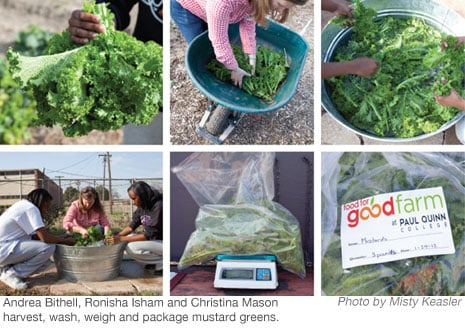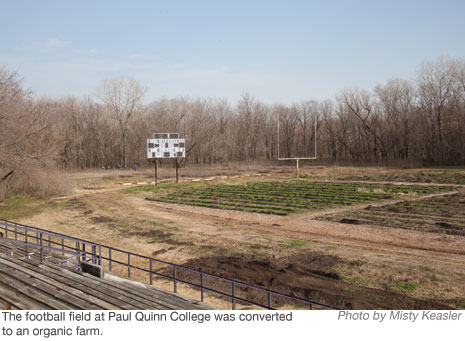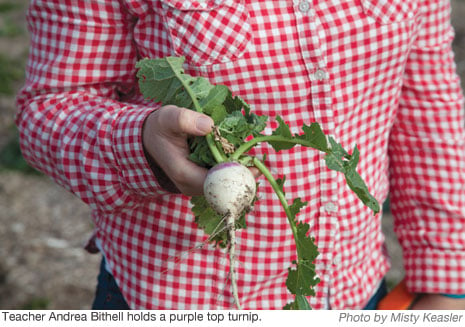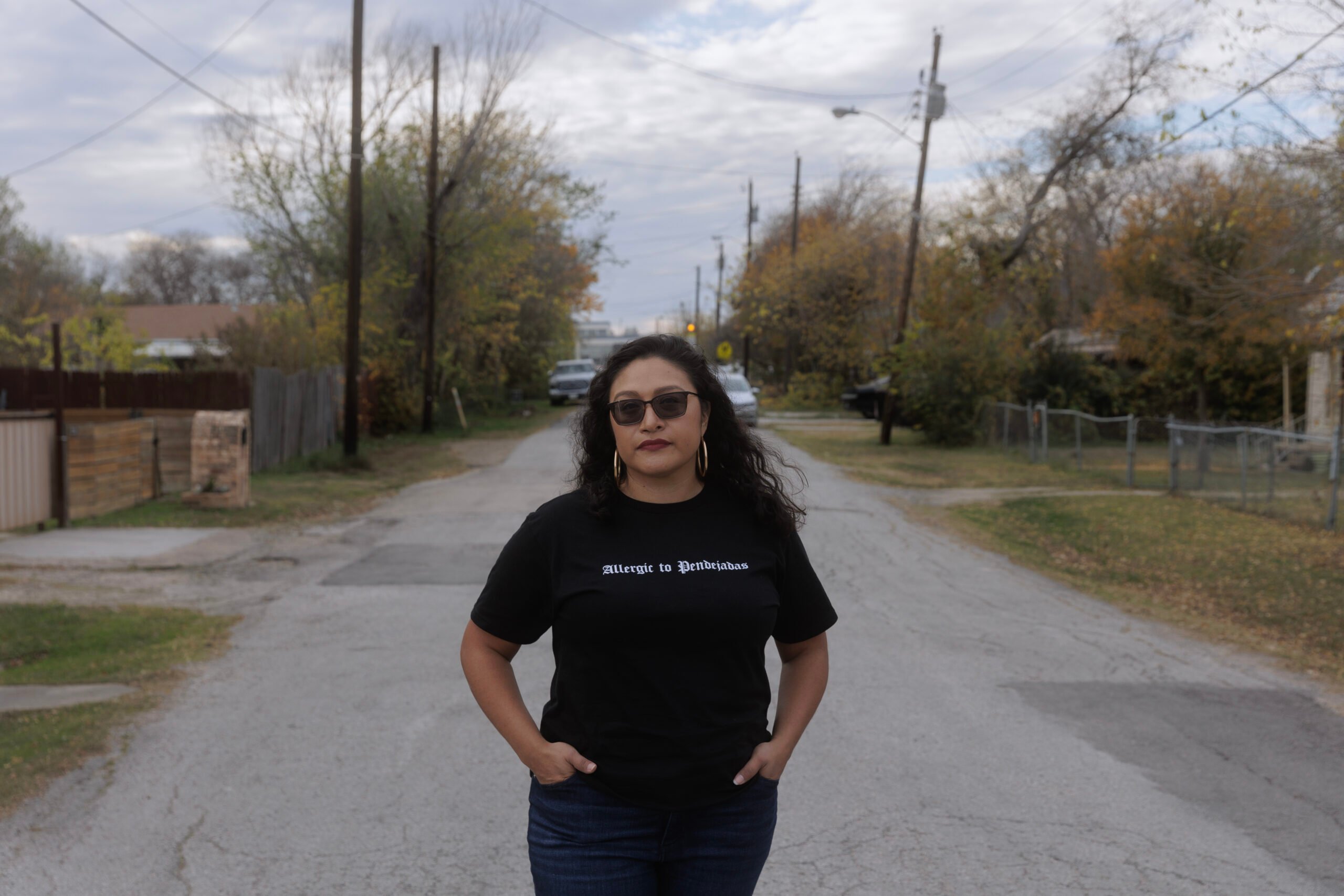Field Goal
Paul Quinn College turns a football field into a farm to end a food desert.
A version of this story ran in the February 2012 issue.
The football games ended years ago at Paul Quinn College. The Tigers’ purple jerseys were packed away, marking the conclusion of a tradition that dated back almost a century. In 2006, the football program was canceled to save money as enrollment declined and financial troubles mounted at the private, Christian, historically black college in Dallas.
Then, in 2010, Michael Sorrell, president of Paul Quinn, had an idea for transforming the struggling college and, at the same time, helping the surrounding community of Highland Hills: Convert the idle football field into an organic farm. The goal was to provide healthy food to a low-income community that has no supermarket. Today Paul Quinn sells produce from the farm to restaurants and to Cowboys Stadium, and offers fresh produce to residents of its South Dallas neighborhood. In the process, students are learning to be stewards of their community.
Highland Hills is in one of 15 Dallas ZIP codes that have been designated as food deserts, according to a 2007 University of Texas at Dallas study. That means residents don’t have easy access to nutritious, reasonably priced food. Driving through Highland Hills, it’s obvious that fresh food options are extremely limited. A local grocery store closed three years ago. Mr. C’s Foodmart sells only a sparse selection of canned goods, and makes hamburgers and chicken wings to order. A truck stop sells fast food.
Residents in the predominantly minority area must travel some six miles to the nearest grocery store in search of fresh produce, and some complain that prices there are high and the quality of food is poor.
Unlike many of her neighbors, Hersha Hall, 38, has a steady job and owns a car, so it’s little trouble for her to drive the 10 miles to a Walmart Supercenter, where she says produce prices are low. Still, the mother of four sympathizes with others in her community who struggle to find healthy food.
“I’m sure it’s hard for other mothers to just keep food—vegetables, milk, the staples—because they don’t have anywhere to get it from,” Hall says. “And if they get it from somewhere around here, they’re paying five dollars for a loaf of bread. It’s a disservice to the community, really.”
Sorrell describes the farm, which has been integrated into the college’s curriculum, as a service to the community. It’s also a way to make Paul Quinn, which turns 140 years old in April, more relevant than ever. “To have an institution that focuses on, say, aeronautical engineering in a community that doesn’t have access to fresh food is a little bit silly,” Sorrell says.

When Sorrell became president at Paul Quinn in 2007, student enrollment was 550, down from an all-time high of 966 in 2004. Then, three years ago, the college lost its accreditation from the Southern Association of Colleges and Schools—a requirement for state and federal aid—and enrollment plunged to 151 in 2010, an all-time low. (Paul Quinn disagreed with the accreditation board and sued; the college has since been accredited by the Transnational Association of Christian Colleges and Schools. Enrollment is now at 201 students.)
Sorrell does not have a background in academia, but he brings to the table what Paul Quinn and Highland Hills seem to need even more: a leader with ingenuity, political know-how, and the ability to bring in financial support. Sorrell has worked in Washington, D.C., as special assistant to the executive director of President Bill Clinton’s Initiative on Race and as a community organizer in Dallas.
Still, Sorrell says, he was not fully prepared for what he saw in Highland Hills.
“I don’t know if I accurately and fully appreciated how beaten-down people were,” he remembers, noting the visible income gap between North and South Dallas. “Ten minutes from downtown [going] north is wonderful,” Sorrell says, while “ten minutes south, this is what we have. How can that possibly be right?”
In addition to ordering the destruction of 15 abandoned buildings on campus, Sorrell was determined to attract a grocery store to Highland Hills. Initially, he tried working with city officials. He served on Mayor Tom Leppert’s Southern Dallas Task Force, which recommends ways to increase economic development in low-income communities. Sorrell even offered to donate campus land to any grocery retailer willing to hire residents and students. There were no takers.
Frustration gave way to outrage in September of last year, when the Dallas City Council voted to require that most of the city’s commercial and residential trash be dumped at the city landfill, just two miles from Paul Quinn. The “flow control” plan, as it was called, included a robust recycling program, and was projected to bring in as much as $20 million per year from fees. Paul Quinn students—Quinnites, they call themselves—protested, attending town hall meetings wearing “We are not trash” T-shirts.
Sorrell, who believes that the landfill has long hindered economic development in Highland Hills, is still livid that the city passed the measure without conducting a community impact study. “We played nice with others and, at the end of the day, the ‘thank you’ we got was rerouting all garbage down the street from our campus,” he fumes.
Soon after that battle, Sorrell realized that a solution to the food desert dilemma lay—quite literally—in the college’s own backyard. Sorrell came up with the farm idea after talking with Dallas real estate developer and investor Trammell Crow whom Sorrell says has a passion for community gardens. Crow introduced Sorrell to PepsiCo, whose Food for Good program delivers nutritious meals to impoverished communities. When Sorrell offered to turn the college’s two-acre football field into a farm, PepsiCo agreed to help fund the venture for an undisclosed amount, as part of Food for Good.

Food for Good is just one example among a growing wave of support for ending food deserts. According to a study conducted by the Reinvestment Fund, which manages financing programs designed to attract supermarkets and grocery stores to underserved urban and rural communities, 25 million Americans live in areas with inadequate access to supermarkets. The United States Department of Agriculture estimates that 6.5 million children live in food deserts. Texas has fewer supermarkets per capita than any other state.
Food desert residents pay with their health. Many rely on fast food and processed food from convenience stores, which tend to be high in fat, sodium and sugar, and can lead to life-threatening health problems including heart disease, diabetes, and obesity. People in more affluent communities, who have better access to healthy food, are more likely to maintain a healthy weight and lifestyle.
The federal government and states have developed comprehensive programs to close the “grocery gap” through the Healthy Food Financing Initiative, which provides grants, low-interest loans, and tax credits for grocery stores and other projects that build in food deserts. Federal agencies such as Treasury, Agriculture, and Health and Human Services have allocated approximately $45 million toward these efforts, and the latest budget signed by President Obama includes $32 million, says Patricia Smith, senior policy advisor for the Reinvestment Fund, based in Philadelphia. Smith adds that Pennsylvania, New York, California and New Jersey, as well as the city of New Orleans, have set up similar programs as part of first lady Michelle Obama’s national “Let’s Move!” campaign to combat child obesity. The campaign’s goal is to eliminate food deserts by 2017.
Even food manufacturers that produce the less-than-healthy beverages and snacks that have contributed to America’s health crisis are stepping up to the plate. Like PepsiCo, Kraft Foods has partnered with nonprofit organizations to operate “mobile food pantries” and sponsor urban community farms. The fact that Kraft and PepsiCo are involved does not surprise Smith. It’s a good public-relations move, in light of the growing awareness about healthy eating, she says. Plus, these companies may be well-served, selling products to new stores in new locations.
When asked why PepsiCo is involved with food desert projects, Food for Good Director Amy Chen wrote in an email that the initiative is in line with PepsiCo’s guiding principle “to explore and develop new ways to do what’s right for our business by doing what’s right for the communities we serve.” She said the Paul Quinn farm project is one of several PepsiCo-supported pilot programs designed to increase access to healthy food in underserved communities.

The Paul Quinn farm does not look much different from other farms, except for the goalposts at each end. Part of the field is designated for seasonal crops, and cover crops allow the soil to replenish itself. Collard greens are grown in a hoop house. Students water the crops by hand with a network of hoses, though the college plans to install a more sophisticated irrigation system.
Now residents of Highland Hills can buy organic produce at a price that stores typically charge for conventional produce. Customers come during scheduled market hours throughout the week to pay for what they pick, or for produce that has already been harvested. The variety is impressive. Depending on the season, shoppers can purchase asparagus, radishes, carrots, beets, sweet potatoes, spinach, a variety of leafy greens, garlic, blackberries and herbs including rosemary, chocolate mint and oregano.
Given that many residents are unlikely to have Internet access, the school publicizes the farm’s offerings in a newsletter. Local churches also announce harvest times. Ten percent of the farm’s proceeds are given to charity.
Farm work is part of Paul Quinn’s curriculum. Students learn how to prepare the soil, seed, water, compost, harvest, and even manage an aquaponic system. The farm serves as a kind of laboratory for a number of courses, including “social entrepreneurship” and botany. Director of Service Learning Elizabeth Wattley explains how “testing beds” allow biology students to compare various soil amendments, including compost, worm castings, and blood meal. “We’ll see who wins the race,” Wattley. “Last year, compost won.”
In the future, the college plans to allow students to apply farm work credit toward philanthropy courses and offer an agricultural business degree centered on the farm.
For some Quinnites, learning about farming and healthy produce is a brand-new experience. Wattley notes that many students come from food deserts similar to Highland Hills. “A lot of them weren’t aware of how [produce] looks when it comes out of the ground,” she says.
Freshman Kendrich Jackson, from New Jersey, thought organic farming at the college would be a “crazy job,” but now he enjoys working on the farm. “I think it’s pretty cool just learning how fresh everything is, and how different it is from [what you find] in the market,” Jackson says.
Students point out that the farm falls in line with Paul Quinn’s “living philosophies,” known as the “Four Ls”: Leave places better than you found them, lead from wherever you are, live a life that matters, and love something greater than yourself.
“I think it’s pretty cool, because you’re learning how you make people feel when you give them stuff that they need,” Jackson says. “You’re changing the community. You’re making a difference just by helping.”
Christina Mason, a junior, says she feels good about helping people who don’t have enough money to acquire food from miles away. “But if you come down here to the farm, you have an accessible way to get fresh organic food.”
Janice Provost, chef and part owner of Parigi restaurant in Dallas, also appreciates the farm. As someone who strives to serve locally farmed produce, Provost uses Paul Quinn potatoes, spinach, arugula, and herbs in such dishes as pear Roquefort salad, stuffed acorn squash, prosciutto arugula pizza, and veal Milanese. Provost says the farm’s produce not only tastes good, it looks beautiful, and it is delivered clean and bundled with twine.
“I mean, you feel like you’re getting a present,” she says.
For Paul Quinn President Sorrell, establishing the farm is only a first step in combating the food desert in Highland Hills. He is also looking to open an on-campus grocery store.
“We are fully committed to doing those things. We will do it ourselves. We will find the investors. We have the land. We can do these things right,” Sorrell says.
For now, Sorrell is dedicated to showing Highland Hills residents a way out of the food desert with the help of a dedicated team of students who raise crops where once touchdowns were scored.
“If all we did was teach [students] to get their education and leave and not improve their communities, then the cycle of poverty will never be broken,” Sorrell says.
Janet Heimlich is an independent journalist and former freelance reporter for National Public Radio. She is also the author of Breaking Their Will: Shedding Light on Religious Child Maltreatment.


